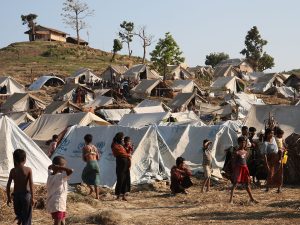
Academics, researchers and policymakers criticized the unbalanced mainstream media coverage of global conflicts and humanitarian crises and proposed solutions to widespread apathy during a virtual panel event Oct. 23.
Sanford J. Ungar, director of Georgetown University’s Free Speech Project, and Michael Scott, senior dean of Blackfriars Hall at Oxford University, moderated the panel, titled “Yesterday’s Forgotten Crises,” to examine why certain crises are prioritized over others and evaluate their root causes and potential solutions. The panel was part of the “Free Speech at the Crossroads: International Dialogues” series co-sponsored by the Free Speech Project and the Future of the Humanities Project, a collaboration between Georgetown and Oxford that examines the intersection of humanities and public life.
Fanta Aw, executive director and chief executive officer of global education and teaching nonprofit NAFSA: Association of International Educators; Louis Goodman, professor and dean emeritus at American University’s School of International Service; Anne Lonsdale, a British sinologist and higher education expert; and Lord Johnny Oates, a member of the House of Lords, the United Kingdom’s upper house of parliament, served as panelists.
Aw said mainstream Western media has not focused on conflicts such as those in the Democratic Republic of Congo, Sudan, Yemen and Haiti because of the tendency to avoid focusing on issues in other parts of the world.
“The primary cause really has to do with how we conceptualize the ‘other’ and how we understand each other,” Aw said at the event. “I don’t think that it is accidental that there is so much of a neglect of those areas in the world.”
Lonsdale added that many groups around the world find it difficult to empathize with people they do not know, no matter how similar their plight may be. She referenced her research on students in Kazakhstan who, despite advocating against poverty and malnutrition in their own country, did not express support for similar efforts in Africa.
“They couldn’t think why we should do it,” Lonsdale said during the panel. “They did quite a lot of good things, but they didn’t understand anywhere else.”
Oates said that relatability and access to information were the most important factors, pointing to, as an example of the impact of media, the BBC’s feature of Ethiopia’s famine 40 years ago that prompted widespread outrage and support for relief efforts across the United Kingdom.
“People are overwhelmed by so many different sources of media,” Oates said during the event. “It’s very difficult to get access.”
Lonsdale said the public is often not receptive to hearing about these “other” crises, which makes humanitarian work more difficult.
“The language of raising money is quite like the language of advertising, and there tends to be a cynicism which slips from one to the other,” Lonsdale said.
Goodman said that the media should emphasize more humanitarian success stories to show that these issues are solvable.
“Let’s grow lessons from success stories,” Goodman said. “The ones that are obvious are in East Asia — Korea, Taiwan and Singapore. These are countries that were horribly autocratic, very corrupt. Leaders came in that had a vision for changing society.”
Aw said that the global community needs to focus on these exemplary leaders in the face of failing leadership.
“I’m concerned that there’s been in many ways an erosion of moral leadership when we look at what’s happening around the world and how things are taking place around the world,” Aw said. “We need to go back to some of those principles.”
Oates said that these lessons show the importance of collective action and underline the responsibility of large democracies to support humanitarian issues beyond the West.
“When we act together and in partnership with those countries, we can make a difference,” Oates said. “But we have to do it collectively and we have to wake up again to that fact.”
Oates added that doing so requires the West to live up to its own values.
“The West is not seen to actually live its values, and when we’re talking about truth, we need to be true to ourselves,” he said.
Aw said that such support must start with individuals and governments actively engaging with humanitarian crises beyond what the media focuses on or what immediately affects them.
“There is the principle by disengaging is how you dissent power — that is simply delusional. There’s no such thing,” Aw said. “There is no such thing as neutrality. To not choose is still to choose.”
Aw added that such engagement would require countries to reframe how they think about humanitarian aid.
“We need to move away from what is a shortsighted, short term sort of thinking, to really thinking about our shared humanity and the long-term investment we’re willing to make,” she said. “To think that what happens in Sudan or what happens in the Congo or Haiti or Yemen and others does not impact us is simply false.”